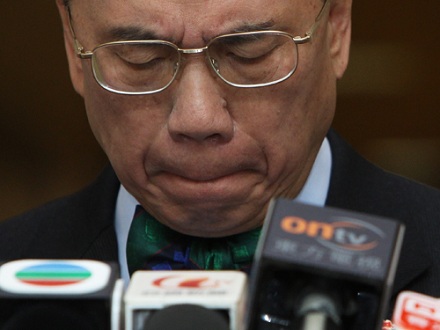Outgoing chief executive Donald Tsang apologized on Friday to Hong Kong residents one day after two damning reports criticized Tsang for accepting luxurious gifts and favors from business tycoons and misuse of public funds — the report of one three-month inquiry, established by Tsang himself amid impeachment calls in March, found his conduct “totally inappropriate”:![]()
![]()
“Because I handled matters improperly, public confidence in Hong Kong’s government as a clean government was shaken and our colleagues in the civil service were disappointed,” he said, bowing his head and looking on the verge of tears. “Here I sincerely apologise once again.”
The disclosure that Tsang had accepted favors from Hong Kong businessmen, including travel of yachts and private jets, special deals for rent on a penthouse in Shenzhen, and other gifts, rocked Hong Kong at the height of the campaign to replace Tsang, who had previously enjoyed a sterling reputation for probity, first as a civil servant for over three decades and as chief executive since 2005.
In another instance, Tsang was discovered to have spent public money for a $6,900 per night suite on a visit to Brazil.
[Former chief justice Andrew Li Kwow-nang] recommended that legislation be enacted so that accepting advantages required the permission of a statutory independent panel, which consists of three members, including a chairman, to be appointed jointly by the chief justice and the president of the Legislative Council.
The committee also suggested that the chief executive and his spouse can receive gifts valued below HK$400; gifts valued between HK$400 and HK$1,000 – if the gifts are inscribed with the chief executive’s or his spouse’s names; and invitations to functions or performances worth up to HK$2,000.
The scandal only amplified other charges of sleaze and corruption surrounding Henry Tang, who lost the chief executive election to Leung Chun-ying on March 25 when it became increasingly clear that both the Hong Kong public and the Chinese leadership in Beijing preferred Leung. Although the 1200-member Election Committee were the only ones with votes in the election, Hong Kong residents made their voices heard loudly during the campaign. It is expected that Hong Kong will hold its first openly democratic chief executive race in 2017.
Tsang will step down on June 30, but said he would work with his successor to craft anti-corruption legislation, which would be an unprecedented step for Hong Kong as it prepares to open the door to full democracy.
Such legislation will rise to the top of Leung’s agenda, which also includes increasingly high housing prices for Hong Kong residents, the strains placed on Hong Kong’s health, housing and other public services by migrants from mainland China and Article 23, a long-controversial anti-subversion law.
